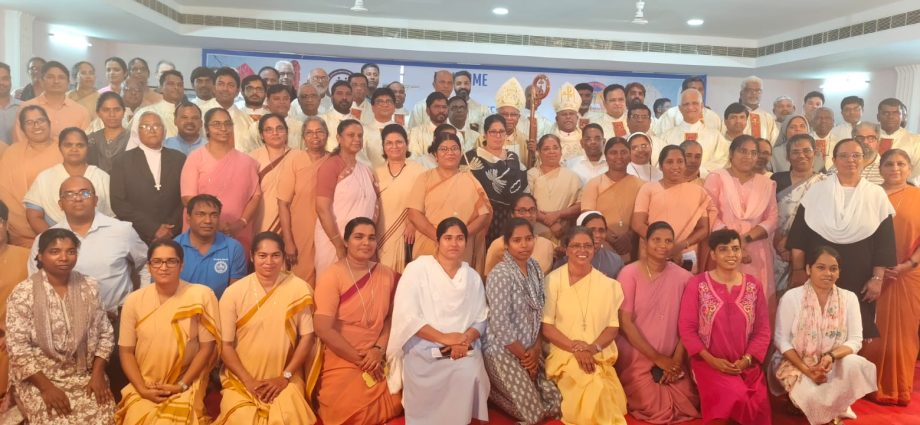By Sujata Jena
Eluru, Dec 9,2024: More than 100 priests, brothers and nuns who practice law have resolved to reach out to those affected by anti-conversion laws and anti-minority atrocities.
The National Lawyers Forum of Religious and Priests (NLFRP) that held its December 6-8 convention at Eluru in Andhra Pradesh has also formed three high-power committees to deal with such cases.
The convention at Eluru’s St. Joseph’s Dental College addressed the theme, “Changing the Landscape – The Context and the Call.”
The convention began with a Mass led by Bishop Jaya Rao Polimeru of Eluru, who has a background in criminal law.
“I am pleased to note there is a good amount of awakening within the Church. There are so many of you—religious priests who are also lawyers,” Bishop Polimeru said welcoming the participants from 16 Indian states.
The bishop stressed God is not only a Father but also a just judge who gives justice to all. Justice, he explained, is about right relationships, which embody equality.
The prelate bemoaned the prevailing inequalities in society and urged Catholic priests and religious lawyers to identify societal issues, understand the plight of the poor, and work towards solutions.
“The best gift we can give to the people is to be instruments of justice,” said Bishop Polimeru who encouraged Catholic lawyers to show solidarity with the poor, care for the vulnerable and elderly, and share resources equitably, emphasizing that wealth is meant to be shared, not hoarded.
In his homily, the bishop urged the participants to follow the example of Jesuit Father Stan Swamy and “stand for God and justice, even if it means enduring hardships or facing risks.”
At the opening session, Father Santhanam Arokiasamy, president of the forum, outlined its origins, purpose, and commitment to upholding citizens’ dignity and rights.
Advocate Isaac Mohanlal, a senior counsel of the Madras High Court who addressed the convention, stressed the importance of four key elements of administration in protecting minority rights. These elements, he explained, are crucial in ensuring that minority communities can establish and administer their own educational institutions.
The elements are:
• Permission: The government cannot deny permission for minority institutions to operate. If permission is rejected, the government must provide reasonable and sensible causes for doing so.
• Construction: The construction of minority institutions can be regulated by local laws, but arbitrary restrictions cannot be imposed.
• Recognition: The government must recognize minority institutions and provide them with the required assistance.
• Affiliation: Minority institutions have the right to seek affiliation from the government or recognized bodies for their institutions.
Mohanlal also stressed the need for vigilance, stating, “A community that doesn’t fight for its rights will die.”
Robin Christopher of the Karnataka High Court, who also addressed the convention, highlighted the complexities of anti-conversion laws in India.
He recalled that Odisha was the first state in India to introduce an anti-conversion law, in 1967. The law required people to simply inform the government of their conversion to change religion. However, over the years, a series of laws have been enacted, with some states imposing stricter regulations than others, Christopher explained.
The Freedom of Religion Acts in various states prohibit conversion by force, fraud, or allurement. However, the laws are often vaguely worded, leading to arbitrary enforcement and harassment of minority communities.
For example, Uttar Pradesh, the most populous state in India, amended the anti-conversion law to allow anyone to file a complaint, whereas earlier only the aggrieved party could do so. The law also presumes guilt, rather than innocence, and charitable activities can be misconstrued as allurement.
Analyzing the anti-conversion laws, Christopher said the vague provisions in various states’ laws often lead to arbitrary enforcement and harassment, despite the fact that the Article 25 of the Indian Constitution guarantees the right to practice, profess, and propagate religion.
Sessions Judge Dunna Ramulu, who gave an overview of the new criminal laws and the Evidence Act, advised the participants to “Work hard, harder, and hardest. There is no alternative to success.”
Forum secretary Sister Flory Menezes, a member of the Sisters of the Cross of Chavanod, reported that the group has in the past year supported the victims of the Manipur violence, demanded action against those attacking churches and minority communities and appealed to the National Legal Services Authority to send lawyers to offer legal assistance to survivors of the sectarian violence in the northeastern Indian state.
The forum was established in 2017.











Excellent initiative in advocacy ministry. Cheers!